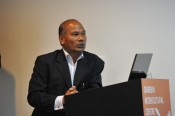Frank Vermeersch has been appointed as Lumbini-Kapilvastu Day Movement Europe Advisor. By profession Mr. Vermeersch is an Engineer in Chemistry and is working in the capacity of Belgium-Nepal Friendship Association President. He initiated to establish Ani Choying Foundation too on Internationally renowned nun and musician and Lumbini-Kapilvastu Day Movement Global Advisor Ani Choying Drolma’s demand and NRN Chief Patron and Consulate General of Nepal to Germany HE Ram Thapa’s advice.
Archive for the ‘Global View’ Category
Frank Vermeersch as Lumbini-Kapilvastu Day Movement Europe Advisor
Posted by Ram Kumar Shrestha on November 20, 2013
Posted in Global View | Leave a Comment »
We Need Schools… Not Factories
Posted by Ram Kumar Shrestha on March 3, 2013
By Sugata Mitra
Unlocking the power of new technologies for self-guided education is one of the 21st century superhighways that need to be paved. Profound changes to how children access vast information is yielding new forms of peer-to-peer and individual-guided learning. The cloud is already omnipresent and indestructible, democratizing and ever changing; now we need to use it to spark the imaginations and build the mental muscles of children worldwide.
This journey, for me, began back in 1999, when I conducted an experiment called the “hole in the wall.” By installing Internet-equipped computers in poor Indian villages and then watching how children interacted with them, unmediated, I first glimpsed the power of the cloud. Groups of street children learned to use computers and the Internet by themselves, with little or no knowledge of English and never having seen a computer before. Then they started instinctually teaching one another. In the next five years, through many experiments, I learned just how powerful adults can be when they give small groups of children the tools and the agency to guide their own learning and then get out of the way.
The Sole Of A Student
From Plato to Aurobindo, from Vygotsky to Montessori, centuries of educational thinking have vigorously debated a central pedagogical question: How do we spark creativity, curiosity, and wonder in children? But those who philosophized pre-Google were prevented from wondering just how the Internet might influence the contemporary answer to this age-old question. Today, we can and must; a generation that has not known a world without vast global and online connectivity demands it of us.
But first, a bit of history: to keep the world’s military-industrial machine running at the zenith of the British Empire, Victorians assembled an education system to mass-produce workers with identical skills. Plucked from the classroom and plugged instantly into the system, citizens were churned through an educational factory engineered for maximum productivity.
Like most things designed by the Victorians, it was a robust system. It worked. Schools, in a sense, manufactured generations of workers for an industrial age.
But what got us here, won’t get us there. Schools today are the product of an expired age; standardized curricula, outdated pedagogy, and cookie cutter assessments are relics of an earlier time. Schools still operate as if all knowledge is contained in books, and as if the salient points in books must be stored in each human brain — to be used when needed. The political and financial powers controlling schools decide what these salient points are. Schools ensure their storage and retrieval. Students are rewarded for memorization, not imagination or resourcefulness.
We need a pedagogy free from fear and focused on the magic of children’s innate quest for information and understanding.— Sugata Mitra
Posted in Article, Global View | Tagged: Aurobindo, Computer programs, Google, Insight, Internet, Montessori, Omnipresent, Plato, Self-guided education, Sugata Mitra, Superhighways, The British Empire, Vygotsky | Leave a Comment »
Gender: Sheryl Sandberg Presents: Deeply Troubling Stats About Women
Posted by Ram Kumar Shrestha on February 28, 2013

Facebook COO Sheryl Sandberg is well on her way to becoming one of the world’s richest self-made women.
And that’s pretty impressive.
More impressive though, is how, instead of buying her own island and retreating to it, Sandberg is using her power and influence to try and improve the world.
She’s written a book called “Lean In: Women, Work, and the Will to Lead.”
It’s an unapologetic manifesto aimed at fixing one of the world’s biggest problems: a lack of women in power.
Sandberg says there are all sorts of reasons women do not hold equal power.
But in this book she talks about one reason in particular: that women are taught that they need to keep themselves out of power, and that they therefore limit their own ambitions and sabotage their own careers.
Sandberg’s most powerful rhetorical device in the book is a saturation of stats that are sometimes shocking and sometimes reverberating – but always the kind that make you reevaluate what’s going on around us. Read the rest of this entry »
Posted in Article, Gender, Global View | Leave a Comment »
Redefining the Meaning of Success: Hillary Clinton’s Next Great Challenge?
Posted by Ram Kumar Shrestha on February 8, 2013
By Arianna Huffington, President and Editor-in-Chief at The Huffington Post Media Group
 We don’t yet know what big challenge Hillary Clinton will take on next, but that she will bring her considerable talents to something big and worthwhile is not in question. Whether or not that challenge is trying to become the first woman president, she’s in a unique position to help redefine success by using her experience to address the issue of stress in the workplace.
We don’t yet know what big challenge Hillary Clinton will take on next, but that she will bring her considerable talents to something big and worthwhile is not in question. Whether or not that challenge is trying to become the first woman president, she’s in a unique position to help redefine success by using her experience to address the issue of stress in the workplace.
Lack of sleep, overwork, and burnout are defining features of America’s business and political culture. They’re not just endemic in corporate suites and the corridors of power — they’re often the standard on which professional advancement is based. This has enormous consequences for our health, on our health care system, on our families and our children, and on our economy. And it makes it much harder to produce leaders capable of making good decisions. Having accomplished so much, and having done it in such a way that causes nobody to question her work ethic, her ability, her drive, her willingness to burn the candle at both ends, Hillary Clinton is in a singular position to change this. She’s proven that women can do anything, and now she can prove that women can do anything differently — and better.
Certainly, she’s well acquainted with the problem — perhaps more so than anybody on earth — having flown more than 900,000 miles to 112 different countries and, possibly even more taxing, having sat in 1,700 meetings with world leaders during her tenure as Secretary of State.
“I hope I get to sleep in,” she told ABC’s Cynthia McFadden about her upcoming plans. “It will be the first time in many years. I have no office to go to, no schedule to keep, no work to do.”
And here’s how she put it to Andrea Mitchell: “I don’t have any real plans to make any decisions. I’m looking forward to some very quiet time catching up on everything from sleep, to reading, to walking with my family. I think it’s hard to imagine for me what it will be like next week when I wake and have nowhere to go. Maybe I’ll go back to sleep for a change!” Read the rest of this entry »
Posted in Article, Global View | Tagged: Arianna Huffington, Challenge, Hillary Clinton, Huffington Post, Success | Leave a Comment »
Paradoxes of Happiness: the Sadness of a Happiness Project
Posted by Ram Kumar Shrestha on February 8, 2013
By Gretchen Rubin, Bestselling author; blogger www.happiness-project.com
 I think everyone could benefit from ahappiness project.
I think everyone could benefit from ahappiness project.
But there’s also a sad side to a happiness project, which comes directly from the first and most important of my Twelve Commandments: “Be Gretchen.”
Being Gretchen, and accepting my true likes and dislikes, means that I have to face the fact that I will never want to visit a jazz club at midnight or pack up to go fly-fishing on a spring dawn. I love diet soda and refuse to try foie gras.
Now, you might think – “Well, okay, but why does that make you sad? You don’t want to visit a jazz club at midnight anyway, so why does it make you sad to know that you don’t want to do that? If you wanted to, of course you could.”
It makes me sad for two reasons. First, it makes me sad to realize my limitations. The world offers so much!–and I’m too small to appreciate it. The joke in law school was: “The curse of Yale Law School is to try to die with your options open.” Which means — at some point, you have to pursue one option, which means foreclosing other options, and to try to avoid that is crazy. Similarly, to be Gretchen means to let go of all the things that I am not — to acknowledge what I don’t encompass. Read the rest of this entry »
Posted in Article, Global View | Tagged: Gretchen Rubin, Happiness Happiness project, sad, secret of adulthood | Leave a Comment »
Congratulations, You’re Sisyphus
Posted by Ram Kumar Shrestha on February 8, 2013
By Hiroshi Mikitani
[Mikitani was born in Kobe, Hyogo prefecture, Japan. Mikitani attended Hitotsubashi University, graduating in 1988. While working for the Industrial Bank of Japan, Mikitani was transferred to the US and from 1993 studied at Harvard University, earning an MBA. Mikitani worked at the Industrial Bank of Japan (now part of Mizuho Corporate Bank) from 1988 to 1996. In 1997 he founded a consulting group called Crimson Group.
for the Industrial Bank of Japan, Mikitani was transferred to the US and from 1993 studied at Harvard University, earning an MBA. Mikitani worked at the Industrial Bank of Japan (now part of Mizuho Corporate Bank) from 1988 to 1996. In 1997 he founded a consulting group called Crimson Group.
Hiroshi Mikitani is the outspoken chairman and Chief Executive of online shopping mall operator Rakuten. In 1997 Mikitani founded Rakuten. He was president from its founding, and in 2001 he also became chairman. In addition, he is also head of the E-Commerce and Banking Business Units and Head of the Development Unit. Among his other titles are also director of Kobo Inc., chairman of Rakuten Card Co., Ltd, chairman of Rakuten Travel, Inc., chairman of Fusion Communications Corporation, and chairman of Crimson Football Club, Inc.The company’s stock price is up on it successful expansion abroad: last year it acquired Germany’s Tradoria online mall, the UK’s Play.com online retail site and others in Indonesia and Russia. Rakuten also has a China online mall in venture with Baidu.com. It is moving into e-books with acquisition of Canada’s Kobe e-reader firm. At the same time, Rakuten is petitioning the Japan Fair Trade Commission to examine Yahoo Japan’s tie-up with Google as a net monopoly. Mikitani owns the Tohoku Rakuten Golden Eagles baseball team. Rakuten donated $3.7 million to earthquake relief efforts and raised millions more via Rakuten Securities and digital wallet service Edy. 48 years Mikitani is billionaires and Net Worth $6.2 B as of March 2012. His this short essay is very encouraging and popular.]
In Greek mythology, there is the story of Sisyphus. Sisyphus is forced to endlessly try to push a rock up a hill. Although Sisyphus works so hard to push the boulder up the hill, every time the boulder falls back down just as he is nearly to the top. And so he must push the boulder up the hill for all eternity.
Sounds awful, right?
Wrong. It’s fun.
In fact, the story of Sisyphus is one that offers a valuable tip for success in business.
Although there are essential differences, business shares some similarities with this story. You are never able to see your next problem before you solve the one at hand, but there is always a next problem. And it is always much more difficult than the one which you faced before. Unlike Sisyphus, you are not constantly going up and down a hill, but you are constantly climbing one, never reaching the top. Read the rest of this entry »
Posted in Article, Global View | Tagged: Billionaires, Chief executive of online shopping mall, Crimson Group., Greek mythology, Harvard University, Hiroshi Mikitani, Hitotsubashi University, Industrial Bank of Japan, Mizuho Corporate Bank, online shopping mall, Outspoken chairman, Rakuten, Sisyphus | Leave a Comment »

















































